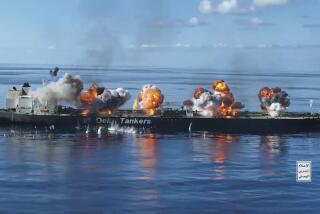Oil Tankers Pose Risk on Bosporus
- Share via
ISTANBUL, Turkey — Every 12 minutes a ship passes through the Bosporus, the narrow strait that zigzags through the city of Istanbul. Commuter ferries shuttling millions of passengers pick their way through the crowd as they dart from shore to shore.
The Bosporus, which divides Europe and Asia and is one of the world’s most dangerous waterways, is about to become more hazardous.
Traffic is expected to increase as oil-rich Caspian states begin sending more crude to Russian ports that ship through the Bosporus.
Oil companies are drilling in Azerbaijan, and a new Caspian pipeline is expected to bring Kazakh oil to Russian ports by late June or July. Turkish officials say they fear that by the end of the year, the amount of oil going through the Bosporus could go up by as much as a third.
“People in Istanbul could die” if there is an accident, warned Capt. Cahit Istikbal, head of the Turkish Maritime Pilots’ Assn. “The Bosporus cannot take the load anymore.”
Foreign Minister Ismail Cem has warned repeatedly that Turkey will not allow the Bosporus to become an oil pipeline.
Last year, 48,000 ships, including 6,000 tankers, passed through the 21-mile waterway, which is only about half a mile wide at its narrowest.
The waterway is the entrance and exit to the Black Sea and the sole sea outlet for Bulgaria, Romania, Georgia, Ukraine and southern Russia. International treaties demand free passage for commercial shipping.
Chic restaurants and old wooden Ottoman homes line the shores. Topkapi Palace, the home of the Ottoman sultans for centuries, sits near the opening to the Bosporus.
On weekends, families stroll or picnic near the shores, watching huge oil tankers cruise by just a few hundred yards away. Vendors at one section of the waterway line a boardwalk selling balloons and treats.
But the waterway is hazardous.
Six accidents occur on the Bosporus every 1 million transit miles, twice the accident rate of the Suez Canal and 30 times that of the Mississippi River.
Unlike the Suez Canal, which largely cuts through desert, the Bosporus flows through a city of 12 million, dramatically increasing the danger if a ship, especially an oil tanker, crashes.
Navigating the crowded strait can be perilous.
Ships must negotiate 12 sharp turns in waters that flow anywhere from 3 to 7 knots per hour.
“The current makes the passing very difficult,” Istikbal said. “It’s like skating on ice. You can’t stop quickly.”
A 6,160-ton ship hauling lumber from Russia lost control April 30, crashing near the seaside home of former Prime Minister Tansu Ciller.
In December 1999, a Russian-made tanker split in two at the mouth of the Bosporus, spilling 235,000 gallons of fuel and blackening six miles of coastline. Many birds were soaked in sticky tar.
The worst recent accident was in 1994 when an oil tanker and a cargo ship collided. Twenty-nine sailors died; the tanker burned for four days.
“In the end, some people will sell their goods and make money, but Turkey is the one who will suffer,” said Environment Minister Fevzi Aytekin.
Some critics, however, point out that Turkey’s protests may be partly political.
Turkey is pushing strongly for an oil pipeline to be built from the Caspian Sea to southern Turkey, bypassing Russia. That would not only reduce traffic on the Bosporus but would boost Turkey’s influence in the region while undercutting Moscow’s prestige.
Turkey also stands to make hundreds of millions of dollars in pipeline tolls.
Istikbal says Caspian oil will increase the demand for tanker traffic by as many as 500 ships this year and 2,000 ships by the end of the decade. Oil industry officials say that claim is exaggerated and, if larger tankers are used, traffic will not increase that significantly.
To improve safety, Turkey is calling on ships to take aboard an experienced local pilot. Some 40% of the ships that cross ignore that request.
Istikbal’s organization, which represents the pilots, estimates that 85% of all accidents are caused by ships that do not have Turkish pilots.
Turkey is planning to install by the end of the year a $30-million monitoring system that tracks vessels along the Bosporus and notifies those facing danger.
More to Read
Sign up for Essential California
The most important California stories and recommendations in your inbox every morning.
You may occasionally receive promotional content from the Los Angeles Times.












